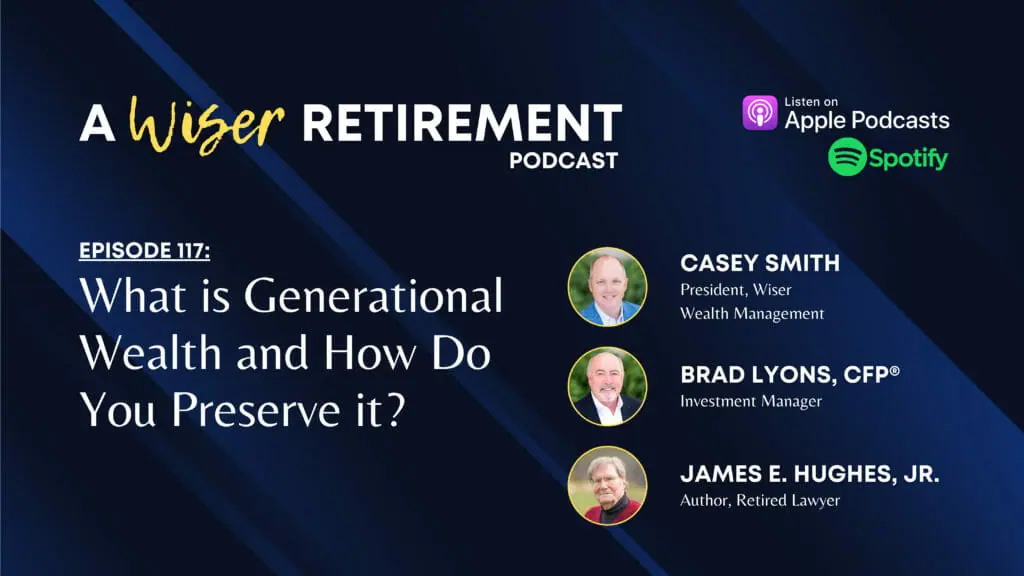
What is Generational Wealth and How Do You Preserve it?
On this episode of A Wiser Retirement Podcast, Casey Smith and Brad Lyons, CFP® introduce a special guest, James E. Hughes Jr., author of Family Wealth: Keeping it in the Family. Hughes talks about how to create a family covenant, the hierarchy of a covenant, the Rockefeller legacy story, and how to structure a team that will work in your best interest. He also discusses some main points from his book, Family Wealth: Keeping it in the Family.
Listen on Apple Podcasts or watch on YouTube:
SUMMARY:
How to Create a Family Covenant
The first step to creating a family covenant is making sure you see your wealth as your well-being. This will help you to look at your wealth differently and sustain it. Another important part of building a covenant is making sure your family can make decisions together. This is pertinent to the success of a family covenant. You must agree on a family goal and make joint decisions. Once you think about your family’s aspirations, agree on a common objective, and turn it into a covenant.
Hierarchy of a Covenant
The hierarchy of a covenant starts with the grandparents as mentors. Then, the next generation is the managers; they work on the day-to-day tasks of building a family legacy. A family needs to work together as a unit. On holidays when the whole family is together, try to make it a point to review your family’s covenant. Repetition is critical for the next generation to carry on the covenant.
Hughes explains at reunions or holidays his family goes around the room and tells stories about the most influential elder in their life and what they have learned from them. This helps grow capital in their family.
The Rockefeller Legacy Story
Hughes explains how the Rockefeller family has flourished due to supportive family members, dream-chasing, and hard work. The Rockefeller family is a powerful story because it shows that each generation must act like the first generation and go after their dreams. Without John D. Rockefeller’s support of his son, the family would not be well-known for their philanthropy and their legacy would be completely different.
The Story – John D. Rockefeller, founder of the Standard Oil Company, retired in 1896. Once he retired, his son John D. Rockefeller Jr. stepped into his father’s role in the business. John D. Rockefeller Jr. quickly decided he wanted to chase his dreams and dedicate his life to philanthropy. He had a conversation with his father, and his father was not only supportive of his son’s idea, but he also wanted his son to help him set up the Rockefeller Foundation. Today, the Rockefeller family is well-known for their philanthropy.
How to Structure a Team for Building a Legacy
The most important thing when building a team is that the people you choose should not be experts with egos. Choose people who will leave their egos at the door and work in your best interest. Because every family is unique, it is important for your team to see your family as a unique system and not compare you to their other clients. Look for people who ask about your aspirations and truly care about your future success.
The James E. Hughes, Jr. Foundation
The James E. Hughes Jr. Foundation, created by Hughes’ close friends, is a non-profit organization dedicated to generational well-being. The purpose of the foundation is to help families flourish so they can help society flourish. Click here to learn more about The James E. Hughes Jr. Foundation.
Download our white paper on “7 Steps to Leave a Financial Legacy”
TIMESTAMPS:
2:19 How to Create a Family Covenant
8:46 The Mayflower Compact
16:33 Hierarchy of a Covenant
23:13 The Rockefeller Legacy Story
29:00 How to Structure a Team for Building a Legacy
35:59 The James E. Hughes, Jr. Foundation
LINKS:
Learn more about Casey Smith and connect with him on Twitter.
Learn more about James E. Hughes, Jr.
CONNECT:
Twitter, Instagram, Facebook, LinkedIn, and YouTube.
Learn more about A Wiser Retirement podcast and access previous episodes.
Share This Story, Choose Your Platform!
Wiser Wealth Management, Inc (“Wiser Wealth”) is a registered investment adviser with the U.S. Securities and Exchange Commission (SEC). As a registered investment adviser, Wiser Wealth and its employees are subject to various rules, filings, and requirements. You can visit the SEC’s website here to obtain further information on our firm or investment adviser’s registration.
Wiser Wealth’s website provides general information regarding our business along with access to additional investment related information, various financial calculators, and external / third party links. Material presented on this website is believed to be from reliable sources and is meant for informational purposes only. Wiser Wealth does not endorse or accept responsibility for the content of any third-party website and is not affiliated with any third-party website or social media page. Wiser Wealth does not expressly or implicitly adopt or endorse any of the expressions, opinions or content posted by third party websites or on social media pages. While Wiser Wealth uses reasonable efforts to obtain information from sources it believes to be reliable, we make no representation that the information or opinions contained in our publications are accurate, reliable, or complete.
To the extent that you utilize any financial calculators or links in our website, you acknowledge and understand that the information provided to you should not be construed as personal investment advice from Wiser Wealth or any of its investment professionals. Advice provided by Wiser Wealth is given only within the context of our contractual agreement with the client. Wiser Wealth does not offer legal, accounting or tax advice. Consult your own attorney, accountant, and other professionals for these services.





